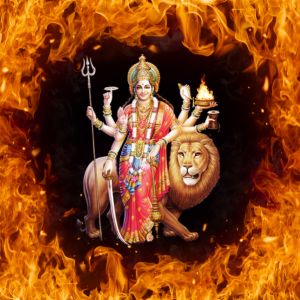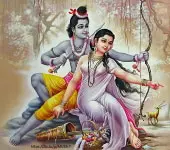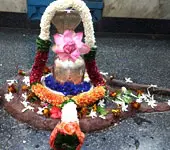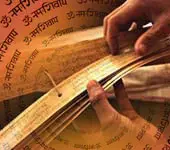Wealth in the Vedic Society
Comments
Transcript
(Click here to read more)
Vedas are not all about Gods, worship, and spirituality. We also get information about how society functioned during Vedic times. For example, the 5th Richa of the 76th Sukta of the 8th Mandala of Rigveda: समाने ऊर्वे अधि संगतासः सं जानते न यतन्ते मिथस्ते। ते देवानां न मिनन्ति व्रतान्यमर्धन्तो वसुभिर्यादमानाः॥ Property belonged to all; private property, as we understand it today....
Transcript
(Click here)
Vedas are not all about Gods, worship, and spirituality. We also get information about how society functioned during Vedic times. For example, the 5th Richa of the 76th Sukta of the 8th Mandala of Rigveda:
समाने ऊर्वे अधि संगतासः सं जानते न यतन्ते मिथस्ते।
ते देवानां न मिनन्ति व्रतान्यमर्धन्तो वसुभिर्यादमानाः॥
Property belonged to all; private property, as we understand it today, did not exist. Property mainly consisted of cattle during those times. The community or the settlement owned it jointly. The policy was to share resources rather than hoarding them for personal gain. To the extent that withholding something from society, having some private asset, was a punishable crime. Mandala 10, Sukta 34, Richa 12 says:
यो वः सेनानीर्महतो गणस्य राजा व्रातस्य प्रथमो बभूव।
तस्मै कृणोमि न धना रुणध्मि दशाहं प्राचीस्तद्दत्तं वदामि।।
I am telling the truth, oh, chief of the community. I am telling the truth, symbolically showing his open hands, indicating that his hands are empty, that is, withholding anything for himself, for his own personal comfort. The mindset was of selflessness and collective well-being.
Atharva Veda also reflects the same spirit, viz., Mantras 5 and 6 of the 30th Sukta of the 3rd Kanda:
ज्यायस्वन्तश्चित्तिनो मा वि यौष्ट संराधयन्तः सधुराश्चरन्तः।
अन्यो अन्यस्मै वल्गु वदन्त एत सध्रीचीनान् वः संमनसस्कृणोमि॥
समानी प्रपा सह वोऽन्नभागः समाने योक्त्रे सह वो युनज्मि।
सम्यञ्चोऽग्निं सपर्यतारा नाभिमिवाभितः॥
Society functioned as an undivided entity, working and achieving together. The society was like-minded; it had common goals. The food is common for all. Food and other resources were distributed equally among members of the society. It is clear that during those times people worked together and enjoyed the results of their labor together. There was no privileged class who enjoyed all benefits who amassed at the expense of the efforts of others. Equality in resource distribution and labor was insisted upon, with no one group monopolizing benefits. Collaboration and cooperation were integral to the functioning of the society. This fostered a sense of unity and mutual support.
Based on this Vedic principle, how can you, as an individual, function in modern society? Actively engage in community activities to contribute to the collective welfare. Fulfill civic duties and responsibilities as a responsible citizen. Stand for equal opportunities and resources for all individuals. Collaborate with others to solve common challenges and achieve shared goals. Take care of the environment and adopt sustainable practices. Uphold ethical standards and promote transparency in all endeavors. Prioritize the interests of the community and nation above personal gain. Stand against division and exploitation, promoting inclusivity and social justice. Foster unity and patriotism among fellow citizens. Work towards building a cohesive and inclusive society for all.
Recommended for you
Durga Saptashati - Chapter 5

anyeshaamapi daityaanaam sarve devaa na vai yudhi . tisht'hanti sammukhe devi kim punah' stree tvamekikaa . indraadyaah' sakalaa devaastasthuryeshaa....
Click here to know more..Lord Rama himself listened to Ramayana from Lava and Kusha
 Click here to know more..
Click here to know more..
Vishwanatha Dashaka Stotram

yasmaatparam na kila chaaparamasti kinchij- jyaayaanna ko'pi hi tathaiva bhavetkaneeyaan. nishkampa eka iti yo'vyayasaukhyasindhu- stam vishvanaathama....
Click here to know more..
English Topics
Vedas
Click on any topic to open
- 86 Wealth in the Vedic Society
- 85 Culture vis-a-vis Agriculture
- 84 Whenever I have Read any Part of the Vedas
- 83 Vedas - Holy Books Of Hinduism
- 82 How The Vedas Manifested Into Material Objects
- 81 What does Rigveda contain?
- 80 Why Vedas are called Shruti?
- 79 What Vedas say about periods
- 78 How Vedas Came Into Existence
- 77 Vedas are eternal, not written by anyone
Please wait while the audio list loads..
30
Ganapathy
Shiva
Hanuman
Devi
Vishnu Sahasranama
Mahabharatam
Practical Wisdom
Yoga Vasishta
Vedas
Rituals
Rare Topics
Devi Mahatmyam
Glory of Venkatesha
Shani Mahatmya
Story of Sri Yantra
Rudram Explained
Atharva Sheersha
Sri Suktam
Kathopanishad
Ramayana
Mystique
Mantra Shastra
Bharat Matha
Bhagavatam
Astrology
Temples
Spiritual books
Purana Stories
Festivals
Sages and Saints
